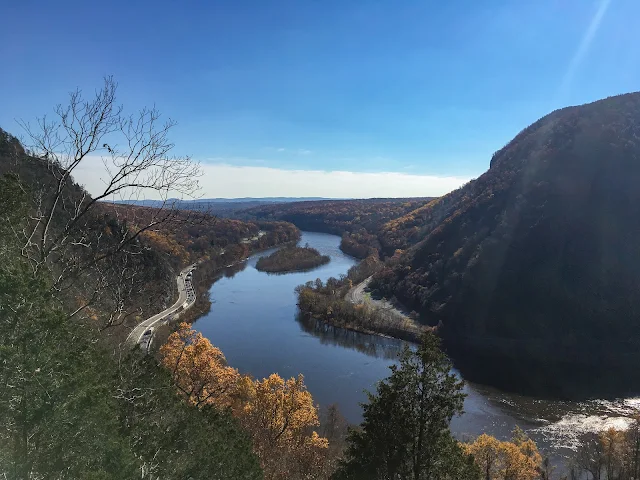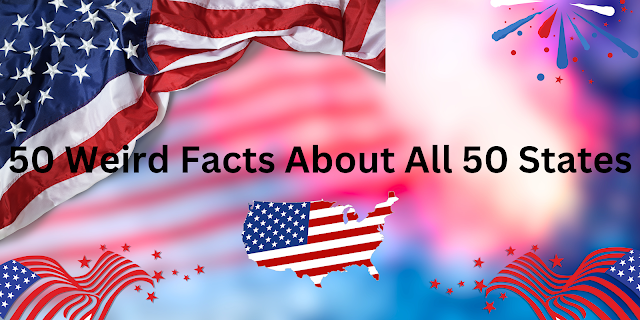50 Weird Facts About All 50 States: Uncover America's Lesser-Known Secrets
Discover the Unusual: America State by State
Ever wondered what makes each state in the U.S. unique? Sure, you might know the state capitals, but what about the weird and wonderful facts that make each state stand out?
From Alabama's official state drink to Wyoming's rare gemstones, we've compiled a list of lesser-known facts for all 50 states. Buckle up; it's going to be an intriguing journey through America's diverse and fascinating states!
Alabama: The Only State with a Beverage
Did you know that Alabama is the only state to have an alcoholic beverage as its official state drink? That's right, Conecuh Ridge Whiskey holds this unique honor.
Alaska: The State You Can Actually See Russia From
Contrary to popular belief, you can actually see Russia from Alaska! On a clear day, the Russian island of Big Diomede is visible from the Alaskan island of Little Diomede.
Arizona: The State with the Most Meteor Craters
Arizona is home to the best-preserved meteor crater in the world. The Barringer Meteorite Crater near Winslow is about 50,000 years old and nearly a mile wide.
Discover more about Arizona.
Arkansas: The Only U.S. State Where Diamonds Are Mined
Arkansas is the only state in the U.S. where diamonds are naturally found. The Crater of Diamonds State Park allows visitors to dig for diamonds and even keep what they find!
California: The Birthplace of the Fortune Cookie
Contrary to popular belief, the fortune cookie was actually invented in California, not China. The sweet treat with a message inside was first created in San Francisco.
Colorado: Home to the Highest Paved Road in North America
Colorado boasts the highest paved road in North America. The Mount Evans Scenic Byway climbs to an elevation of 14,130 feet above sea level.
Find out more about Colorado.
Connecticut: The Birthplace of the Hamburger
The first hamburger in the U.S. was served in New Haven, Connecticut, at Louis' Lunch back in 1900. The joint still operates today, serving burgers cooked in the original cast-iron grills.
Learn More about Connecticut
Delaware: The First State to Ratify the Constitution
Delaware was the first state to ratify the U.S. Constitution on December 7, 1787, earning it the nickname "The First State."

Learn More about the state of Delaware
Florida: The Only Coral Reef in the Continental U.S.
Florida is home to the only living coral barrier reef in the continental United States. The Florida Reef is the third-largest coral barrier reef system in the world.
Georgia: The Peach State Without the Most Peaches
Although known as the Peach State, Georgia is not the leading producer of peaches in the U.S. That title goes to California. However, Georgia peaches are renowned for their superior flavor and texture.
Hawaii: The Only State with a Tropical Rainforest
Hawaii is the only U.S. state that is home to a tropical rainforest. The Hawaiian Islands have several rainforests, but the most famous is the one located in the Waipio Valley.
Idaho: The Potato State That's More Than Just Potatoes
While Idaho is famous for its potatoes, it's also the largest producer of trout in the U.S. The state's numerous freshwater rivers and lakes make it an ideal location for trout farming.
Illinois: The Land of Lincoln... But Not His Birthplace
Although Illinois is known as the "Land of Lincoln," Abraham Lincoln was not born there. He was born in Kentucky but moved to Illinois at the age of 21, where he began his political career.
Indiana: The Home of the World's Largest Children's Museum
Indiana is home to the world's largest children's museum, The Children's Museum of Indianapolis. With over 130,000 artifacts and exhibits, it's a wonderland for kids and adults alike.
Iowa: The Birthplace of Sliced Bread
Iowa is the birthplace of sliced bread. Otto Frederick Rohwedder, an Iowan, invented the first bread-slicing machine, revolutionizing the way we eat bread today.
Kansas: The Geographic Center of the 48 Contiguous States
Kansas is the geographic center of the 48 contiguous United States. The exact spot is located near the town of Lebanon, marked by a small monument.
Kentucky: The Birthplace of Bluegrass Music
Kentucky is known as the birthplace of Bluegrass music, named after the "Blue Grass Boys," a band led by Kentuckian Bill Monroe.
Louisiana: The Birthplace of Jazz
Louisiana, specifically New Orleans, is considered the birthplace of Jazz music. The genre was developed in the early 20th century, blending African rhythms with European harmonies.
Maine: The Only State with a One-Syllable Name
Maine is the only state in the U.S. with a one-syllable name. It's also the only state that shares its border with only one other state.
Maryland: Home of the U.S. National Anthem
Maryland is the home of the U.S. National Anthem. Francis Scott Key wrote "The Star-Spangled Banner" during the Battle of Baltimore in 1814.
Massachusetts: Birthplace of Volleyball
Massachusetts is the birthplace of volleyball. The game was invented in Holyoke by William G. Morgan in 1895 as a less strenuous alternative to basketball.
Michigan: The Cereal Capital
Michigan is known as the Cereal Capital of the World. Battle Creek, Michigan, is the headquarters of the Kellogg Company, founded by Will Keith Kellogg in 1906.
Minnesota: Land of 10,000 Lakes
Minnesota is known as the "Land of 10,000 Lakes," but it actually has 11,842 lakes that are 10 acres or larger.
Mississippi: Birthplace of the Teddy Bear
Mississippi is the birthplace of the Teddy Bear. The stuffed animal was created in honor of President Theodore Roosevelt after he refused to shoot a bear during a hunting trip in the state.
Missouri: The Show-Me State
Missouri is known as the "Show-Me State," a nickname that reflects the skepticism and straightforwardness of its residents. The phrase is said to have originated from a speech by Congressman Willard Vandiver in 1899.
Montana: The Treasure State
Montana is known as the "Treasure State" due to its rich mineral reserves. The state is a leading source of copper, gold, silver, and coal.
Nebraska: Home of Kool-Aid
Nebraska is the birthplace of Kool-Aid, one of America's most iconic beverages. It was invented in 1927 by Edwin Perkins in the city of Hastings.
Nevada: The Only State with Legal Brothels
Nevada is the only U.S. state where prostitution is legal in some counties. It's also home to Area 51, a highly classified and mysterious U.S. Air Force facility.
New Hampshire: First in the Nation Primary
New Hampshire is famous for its "First in the Nation" presidential primary, which has been held since 1920. The state plays a significant role in shaping the U.S. presidential race.
New Jersey: The Diner Capital of the World
New Jersey is often called the "Diner Capital of the World," boasting more diners per capita than any other U.S. state. It's a haven for late-night eats and classic American fare.
New Mexico: The Land of Enchantment
New Mexico is known as the "Land of Enchantment" for its scenic beauty and rich history. It's also the birthplace of Smokey Bear, the U.S. Forest Service's wildfire prevention mascot.
New York: The Empire State
New York is known as the "Empire State," a nickname reflecting its wealth and resources. It's also the birthplace of the potato chip, invented in Saratoga Springs in 1853.
North Carolina: First in Flight
North Carolina is known as the "First in Flight" state, as it was the location of the Wright brothers' first powered flight in 1903 at Kitty Hawk.
North Dakota: The Peace Garden State
North Dakota is known as the "Peace Garden State," named after the International Peace Garden on the border between North Dakota and Manitoba, Canada.
Ohio: The Birthplace of Aviation
Ohio is known as the "Birthplace of Aviation" because the Wright brothers, inventors of the first successful airplane, were born in Dayton.
Oklahoma: The Sooner State
Oklahoma is known as the "Sooner State," a nickname that originated from the settlers who claimed land sooner than they were supposed to during the Land Run of 1889.
Oregon: Home of Crater Lake
Oregon is home to Crater Lake, the deepest lake in the United States, formed more than 7,700 years ago following the collapse of Mount Mazama.
Pennsylvania: The Keystone State
Pennsylvania is known as the "Keystone State" because of its central position among the original Thirteen Colonies. It's also the birthplace of the United States Marine Corps.
Rhode Island: The Smallest State with a Big Name
Rhode Island may be the smallest state, but it has the longest official name: "The State of Rhode Island and Providence Plantations."
South Carolina: The Palmetto State
South Carolina is known as the "Palmetto State" due to the state tree, the Sabal Palmetto. These trees were used to build a fort during the Revolutionary War.
South Dakota: Land of Mount Rushmore
South Dakota is home to Mount Rushmore, an iconic American monument featuring the faces of four U.S. Presidents: Washington, Jefferson, Roosevelt, and Lincoln.
Tennessee: The Volunteer State
Tennessee is known as the "Volunteer State," a nickname earned during the War of 1812 due to the prominent role played by volunteer soldiers from Tennessee.
Texas: The Lone Star State
Texas is known as the "Lone Star State," symbolizing its former status as an independent republic and its struggle for independence from Mexico.
Utah: The Beehive State
Utah is known as the "Beehive State," symbolizing thrift, industry, and perseverance, virtues that are highly esteemed in the state's predominant Mormon culture.
Vermont: The Green Mountain State
Vermont is the leading producer of maple syrup in the United States, accounting for over 40% of the nation's supply.
Virginia: The Old Dominion State
Virginia is often called "Mother of Presidents" as it is the birthplace of eight U.S. presidents, more than any other state.
Washington: The Evergreen State
Washington is the only state to be named after a United States president, George Washington.
West Virginia: The Mountain State
West Virginia is the only state in the Union to have acquired its sovereignty by proclamation of the President of the United States.
Wisconsin: The Badger State
Wisconsin is known as the "Cheese State," but it's also the state with the most breweries per capita.
Wyoming: The Equality State
Wyoming was the first state to grant women the right to vote, earning it the nickname "The Equality State."
Discovering America, One State at a Time
From sea to shining sea, each state in the U.S. offers its own unique history, culture, and quirks. We hope this article has piqued your curiosity to learn more about the diverse tapestry that makes up America. Happy exploring!
Frequently Asked Questions
Why are some states split into two, like North and South Dakota?
The division of some states into two separate entities often has historical, geographical, or political reasons. In the case of the Dakotas, the division was primarily political.
Why do some states have weird shapes?
The shapes of states are often determined by a mix of natural boundaries, like rivers and mountains, and historical treaties or land acquisitions.
What's the difference between a state and a territory?
States are sovereign entities with representation in the federal government, while territories are directly governed by the federal government and have limited self-governance.
Why do some states have so many people while others have so few?
Population density varies due to factors like job opportunities, quality of life, climate, and historical migration patterns.
Why are there two Carolinas and two Virginias?
Both sets of states were originally single colonies that were divided for political and administrative reasons. North and South Carolina were separated in 1712, while Virginia and West Virginia were separated during the Civil War.
Your go-to guide for understanding healthcare policies across U.S. states. Learn about insurance, state rules, and make smart choices.



